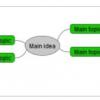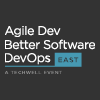 |
Using Mind Maps to Create Comprehensive Test Plans in Your ALM Mind maps work well for planning the test strategy and monitoring project status. Mind-mapping software makes all this easy, and the visual presentation keeps everyone in the loop. Ritinder Kaur shows how mind maps can communicate ideas clearly and help you execute them exactly to create a comprehensive test plan.
|
|
 |
4 Ways to Boost Your Test Process with Service Virtualization One of the major challenges in software development is ensuring that all the software components needed to do integration and end-to-end testing are available in the test environment. Implementing service virtualization can remove environment setup as a blocking condition—and enable project teams to release better software, faster.
|
|
 |
The Evolution of z/OS Development Kristin Cowhey explains how z/OS development has evolved throughout the years and what that means for developers and tech personnel. With legacy developers leaving the workforce, there’s a dire need to replace the knowledge in order to maintain the mainframe systems and applications that are still in use today.
|
|
 |
Managing Component Dependencies Bob Aiello explains that software engineers and architects do an amazing job designing a system’s architecture that fully represents all of the parts of the system that are created during the development lifecycle. However, one of the biggest challenges is understanding how each part of the system depends upon the others.
|
|
 |
Use DevOps to Drive Your Agile ALM Successful DevOps operations assume that your team has the ability to adjust with constant change. To succeed at continuous integration and deployment, a comprehensive agile plan is needed. Bob Aiello and Leslie Sachs identify four critical success factors that you should employ.
|
|
 |
Improve Agile Quality—Three Pillars at a Time A key component to being agile is the adoption of testing from the very inception of the project. According to Bob Galen, to achieve a high degree of quality assurance, there needs to be a careful balance among development and test automation, software testing, and cross-functional team practices.
|
|
 |
The Evolution of Testing Centers of Excellence According to Rajini Padmanaban, a testing center of excellence (TCoE) must be instituted for the establishment of any enterprise software development organization. Rajini presents the latest TCoE trends used by successful IT organizations.
|
|
 |
Adopting ALM Will Enhance the Value of Your Test Team Modern ALM emphasizes total team involvement and a comprehensive set of tools so that the development lifecycle runs smoothly. Joe Farah shows you how test case management is a vital component to a successful ALM strategy.
|
|
 |
Advance ALM and DevOps Practices with Continuous Improvement
Slideshow
Do you want to improve your application lifecycle and incorporate DevOps practices quickly with limited resources? If so, you’re experiencing a common scenario – not enough budget and unrealistic time constraints. Your big multi-year application lifecycle management (ALM) project seems...
|
Jason St-Cyr, Nonlinear Digital
|
|
|
ALM in the Cloud: Bringing Code to the Cloud and Back Again The deployment destination for today’s applications is going through its biggest transition since the rise of the application server. Platform-as-a-Service (PaaS) and other cloud service offerings are putting pressure on every stakeholder in the application lifecycle, forcing us to modernize both our skill sets and tool stacks. Mik Kersten describes the key cloud technology trends and demonstrates how the coming wave of cloud-friendly application lifecycle management (ALM) tools and practices will become the defining factor for productivity and ultimate success. Discover the new challenges developers face when deploying and debugging multi-tenanted applications on hosted infrastructures. Learn how continuous integration loops require testers to learn new tools that connect them directly to running applications.
|
Mik Kersten, Tasktop Technologies
|
|
|
Building a Requirements Foundation with Customer Interviews Whether you are building a brand new product or evolving an existing system, understanding the business needs of your customers is the foundation of a marketable product or valuable internal application. Few of us are experts in interviewing techniques, and few customers talk about their tasks, needs, and context in neat, concise statements about requirements. Hone your elicitation skills and learn what it takes to get beneath the surface and understand your customers: their world, how they work, and what really bothers them. With effective interviewing techniques and skills, you will get inside their heads and better understand their needs within their context.
|
Esther Derby, Esther Derby Associates Inc
|
Visit Our Other Communities
StickyMinds is a TechWell community.
Through conferences, training, consulting, and online resources, TechWell helps you develop and deliver great software every day.

